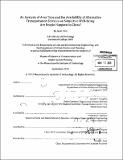| dc.contributor.advisor | Joseph F. Coughlin and Frederick P. Salvucci. | en_US |
| dc.contributor.author | Choi, Janet (Janet I.) | en_US |
| dc.contributor.other | Massachusetts Institute of Technology. Department of Urban Studies and Planning. | en_US |
| dc.date.accessioned | 2014-03-19T15:47:21Z | |
| dc.date.available | 2014-03-19T15:47:21Z | |
| dc.date.copyright | 2013 | en_US |
| dc.date.issued | 2013 | en_US |
| dc.identifier.uri | http://hdl.handle.net/1721.1/85816 | |
| dc.description | Thesis: S.M. in Transportation, Massachusetts Institute of Technology, Department of Civil and Environmental Engineering, 2013. | en_US |
| dc.description | Thesis: M.C.P., Massachusetts Institute of Technology, Department of Urban Studies and Planning, 2013. | en_US |
| dc.description | Cataloged from PDF version of thesis. | en_US |
| dc.description | Includes bibliographical references (pages 155-159). | en_US |
| dc.description.abstract | This study is a comprehensive analysis of how rural, suburban, and urban areas compare in terms of the subjective well-being (SWB) of their residents and how the availability of transportation services affects SWB. Because an urban environment is often associated with better access to and service for alternative modes of transportation, this study specifically examines the impact of the availability and quality of alternative transportation modes on SWB. In this investigation, SWB is broken down into five different concepts: overall wellbeing, current and future life evaluations, happiness, and city/area satisfaction. A series of geographic analyses indicate SWB can vary significantly depending on the area type (rural, suburban, or urban) and the specific SWB concept in question. In general, urban areas tend to have higher overall Well-Being Index scores, which encompass a variety of SWB concepts. However, urban areas tend to score lower than rural and suburban areas in terms of being happy yesterday and city/area satisfaction. A comparison of urban and suburban areas for ten cities with high levels of alternative transportation services finds that suburbs generally have higher SWB levels than urban areas. Regression analyses indicate commute time is generally a statistically significant negative factor for most concepts of SWB while high levels of walkability and bikeability are positive contributors. When looking at the direct effects of area type, living in a rural or suburban area has a positive impact on city satisfaction and a negative impact on future life evaluation. However, when income is interacted with area type, area type becomes less significant. Finally, location in a city with high alternative transportation service levels does not have a significant impact on SWB for the employed population but does have a significant impact for the unemployed population. Due to the variation in results by area type, geography, and SWB concept, public policies intended to increase SWB should ideally be tailored to a specific area. However, general strategies that could be useful across the United States include reducing commute time and improving walkability/bikeability. Walkability should include a consideration of personal safety and security in addition to distance to various amenities. | en_US |
| dc.description.statementofresponsibility | by Janet Choi. | en_US |
| dc.format.extent | 159 pages | en_US |
| dc.language.iso | eng | en_US |
| dc.publisher | Massachusetts Institute of Technology | en_US |
| dc.rights | M.I.T. theses are protected by copyright. They may be viewed from this source for any purpose, but reproduction or distribution in any format is prohibited without written permission. See provided URL for inquiries about permission. | en_US |
| dc.rights.uri | http://dspace.mit.edu/handle/1721.1/7582 | en_US |
| dc.subject | Civil and Environmental Engineering. | en_US |
| dc.subject | Urban Studies and Planning. | en_US |
| dc.title | An analysis of area type and the availability of alternative transportation services on subjective well-being : are people happiest in cities? | en_US |
| dc.type | Thesis | en_US |
| dc.description.degree | S.M. in Transportation | en_US |
| dc.description.degree | M.C.P. | en_US |
| dc.contributor.department | Massachusetts Institute of Technology. Department of Civil and Environmental Engineering | |
| dc.contributor.department | Massachusetts Institute of Technology. Department of Urban Studies and Planning | |
| dc.identifier.oclc | 872126887 | en_US |
